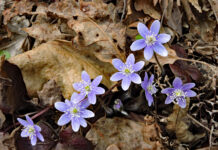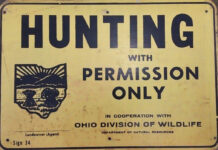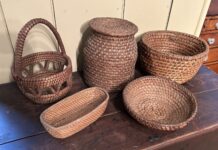“My doctor has ordered me to put my head in traction for ten minutes twice a day. I have rigged a delightful traction center in the barn, using a canvas halter, a length of clothesline, two galvanized pulleys, a twelve-pound boat anchor, a milking stool, and a barn swallow. I set everything up so I could work the swallow into the deal, because I knew he would enjoy it, and he does. While his bride sits on the eggs and I sit on the milking stool, he sits on a harness peg a few feet away, giggling at me throughout the ten-minute period and giving his mate a play-by-play account of man’s fantastic battle with himself, which in my case must look like suicide by hanging.”
— E. B. White, Coon Tree
I heard a radio report last week which conveyed that farmers have some of the most challenging and painful spinal issues seen in the medical field.
Yesterday, as I read the current Reader’s Digest (April) I learned that American farmers die by suicide at nearly twice the rate of the general population.
Farmers carry too much, shoulder it all, soldier on.
Sadly, I would guess that neither point comes as an enormous surprise to anyone personally familiar with this way of life.
It is a wonderful life, but there is no denying it is a hard one.
Different from our ancestors, who spent time with neighbors on a very regular basis, farmers of today often work in isolation.
E.B. White, his success as a writer making him famous the world over, often said he was a farmer first.
His love of the barn and the barnyard is what served as the inspiration to “Charlotte’s Web” which has become a classic in many languages.
It was a great deal of physical pain, encompassed on all sides of those sharp edges by crippling melancholy, that prompted White to seek medical help.
He had suffered alone for quite some time, and had reached the point of almost unbearable mental and physical strain.
In a letter penned in January 1945, he told a friend, “Don’t worry about my health — I am a lot better and plenty good enough for my purposes. I had two things the matter with me — mice in the subconscious and spurs in the cervical spine. Of the two, the spine trouble was less bothersome. It took me eighteen months to find out how you get rid of mice … Anyway, here I am, in the clear again and damned thankful to be there. I can work without falling apart, and can sleep — which is quite refreshing after a year and a half.”
Mental and physical health, when hale and hearty, are two of the most under-appreciated factors throughout a lifetime.
I never quite grasped the opposite of good mental health until a serious fall on ice one winter morning a few years back damaged my frontal lobe function along with other complicating issues, including serious vision challenges.
There simply aren’t words to explain the suffocating symptoms.
No matter where I was, it felt like it wasn’t where I was supposed to be, causing frantic unrest.
Social withdrawal, wrapped immediately in shame for not being grateful enough for all the good in life, sets a person up for spiraling sadness and self-loathing.
The physical damage incurred cost me a daily job that I loved, and the emotional turmoil quietly grew.
Struggles remain, but slowly finding my way back to ‘me’ has been an eye-opening experience.
I have far more empathy than I once did.
It goes without saying that these are trying times for everyone in agriculture.
It can be hard to find the words with those we see every day because we are busy putting life on cruise control, not wanting to upset the people around us.
If you find yourself needing a sounding board, please consider reaching out to the Farm-Aid hotline, 800-FARM-AID (800-327-6243) or the National Suicide Prevention Lifeline (800-273-8255).














Judith, Thank you for listing Farm Aid as a resource for farmers. We are here for all farmers and can help connect farmers to financial, legal and mental health resources. We’re here even if a farmer just needs someone to talk to. Thank you as well for calling attention to the incredible stress that farmers are under right now. And thank you for sharing your personal story. This is a beautiful article.